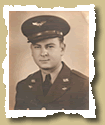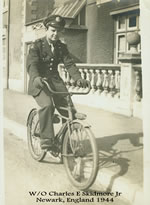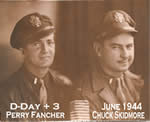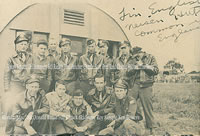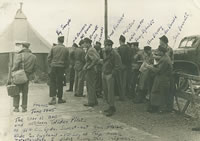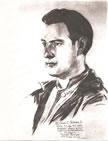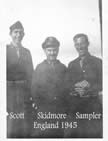| The Assault | Timeline | Maps | Men of D-Day | Photos |

|
My name is Charles E. Skidmore, Jr., better known as Chuck Skidmore. I am an American who was born on January 17, 1920, in Columbus, Kansas, a small town in Cherokee County, Kansas, just across the line from Joplin, Missouri. Following my graduation with a journalism major from Kansas University at Lawrence, Kansas, in June 1941, I enlisted in July 1941 in the aviation cadet program. I completed 60 days of primary training on Ryan Aircraft at King City, California and went on to basic training on Vultee Trainers at Moffett Field near San Jose, California. I was eliminated from the flying program there in the fall of '41 due to so called "flying deficiency." I returned home, and finally in July 1942 enlisted in the glider program as a Class-A glider pilot, because I already had a private pilot's license. Only a limited number with no previous flying experience were accepted for a few weeks during early 1942. I took my dead stick training
at Pittsburgh, Kansas, 16 miles from where I was born in Columbus,
Kansas. Dead stick training means: flying up, cutting the power
off and gliding back to earth. We were assigned to Balderton Airdrome near Newark, England, in the Midlands, until a month or so before the invasion, when we were moved to Taunton, near the southern coast, for the actual invasion of Normandy. June 1, 1944. It was time to invade Hitler's fortress Europa. We could feel the tension in the air. Then came June 3 and we were herded into a block of barracks behind barbed wire. Uncle Sam wasn't about to let any of his invasion party troops wander off downtown and give away any secrets that we might have had. And that's not to say that a single one of us knew our exact destination along the coast of France. Only Ike knew the landing spots and he didn't disclose them until sealed orders were brought to commander and flight planners 24 hours in advance. The briefings for the aerial invasion of Utah Beach, our particular designation, were serious matters, but not without a little pressure-relieving levity upon occasion. Our 439th Troop Carrier Chaplain, Father Whalen, had probably heard about all the profanity known to mankind because he was a prison chaplain at Joliet, Illinois prior to volunteering for the service. So he wasn't shocked at one of the briefings to hear some profanity which included the Lord's name. Upon looking around his listeners, the briefer stopped to apologize to the good Father. "Don't worry about what I think," said Father, "worry about what the Lord thinks."
Speaking of C-47s, those work horses of World War II, they were actually underpowered for many of the jobs they were called upon to do, including pulling heavily weighted gliders. One of our C-47s carried a radio crewman who must have weighed nearly 300 pounds. Nobody knew his exact weight. But he was heavy enough to upset the trim of the C-47 as he walked to the rear. His pilot, a Captain Anderson, joked to a buddy that he intended to tie the sergeant to the seat at the radio because he didn't want to worry about keeping his plane trimmed straight and level during the assault on D-Day. My group briefing was somber right up until the final moment. "Sir," asked the glider pilot, "what do we do after we land our gliders?" There was a brief period of silence, after which the briefing officer, a non-flying person, admitted, "I don't know. I guess we never really thought of that." Perhaps it was true. I thought then and there amid a lot of laughter, that maybe glider pilots really were originally meant to be expendable in war. The best answer to the question came from a glider pilot sitting next to me. He said, "Run like hell." D-Day arrived for glider pilots in England. Breakfast was at 4:00 in the morning featuring honest to goodness fried eggs and a huge piece of chocolate cake. I suspected that the cook believed that he was cooking a last meal for us, and that the food glider pilots liked most was fried eggs and cake. Where he got the fresh eggs, I'll never know. We hadn't had any in the previous 4 months we'd been in England. "The condemned ate the hearty meal," chirped on wag. When I arrived at our glider ready for the trip to Normandy, the other pilot and I carried our parachutes onto the glider between two rows of airborne infantrymen who were already seated on either side of the glider. We put our parachutes in the seats, actually, because the seats were built low on purpose to accommodate a seat pack and still allow tall pilots room for their head. About that time, a burly airborne paratrooper lieutenant stuck his head in between us two pilots and said, "There's no use in you two fastening those 'chutes. We'd never let you use them anyway." I thought that was putting it plainly, so I didn't even bother to drape the straps over my shoulders. You didn't argue with a airborne infantry officer. One C-47 pilot in our squadron was quite a comic. It happened he was a copilot on a goonie-bird that pulled me into France on D-Day. All we had for communication between the airplane and the glider was a telephone wire stretched along the tow rope. As we flew along the east side of the Normandy peninsula, waiting the right hand turn into the Utah Beach landing area, I noticed numerous splashes in the water below us. Anderson, "I asked on my phone, "what's making all those splashes?" "Those are P-51s dropping their tip tanks." "Anderson," I replied, "you're a damn liar. There aren't that many tip tanks in the whole Army Air Force." The splashes must have been German shells falling in the water. Two good glider pilot buddies in my squadron were Johnny Bennett and Charlie Balfour, the latter now deceased. Those two were as close as friends could be, but they were forever arguing about one thing or another. One bone of contention concerned whether or not glider pilots would ever be committed to combat in Europe. Charlie said yes and Johnny said no, right up until ,D-Day. They asked to make the Normandy invasion together, and flipped a coin to see which would fly as pilot and which as copilot. Bennett won the toss, and, along with a string of hundreds of gliders, they crossed the English Channel, flew inland over Utah Beach, and then Bennett released his glider from the tow and started his descent from 900 feet. They glided silently for a few seconds, and then Balfour broke the silence with these words: "Johnny, they'll never fly gliders in combat." For several seconds, there was hilarious laughter between the pair, despite the hail of bullets that started coming up from the Germans below. The airborne troops sitting at the rear must have thought the two were slightly nutty. Luckily, all of them got on the ground unscathed. When the other pilot and I cut ourselves free from the tow planes for the Normandy landing, we caught a burst of machine gun fire from the ground which missed my head by about a foot, and then stitched the right wing from end to end. The first bullet - I was flying copilot - just missed my head as we turned our plane to the left, and that why it didn't get us. If we'd gone another second farther (or a half second) it would have gotten us both right in the face and we'd have probably all gone down. Germans had flooded our proposed landing area so we landed in 3 feet of water. I went out the side of the pilot section by tearing off the canvas and tumbling in the water after first removing my flak vest. One guy didn't have the presence of mind to take off his jacket and fell into a hole where the water was over his head. Luckily for him, the other glider pilot rescued him after a series of frantic dives. It was pretty funny, though, to watch this big tall pilot as he dived down, came up, shook the water out of his eyes, looked around, then dived again. He must have dived down about 3 times before he found his little copilot. Upon landing, we discovered the source of the ground fire which nearly got me. It turned out to be a bunker containing about a dozen conscripted Polish soldiers with one German in charge. After the glider infantrymen from several gliders, including ours, directed a hail of rifle fire at the bunker, the resistance ceased. The there was silence in the bunker, and then a single shot. Then there were shouts and laughter, and the Poles emerged with their hands held high and surrendered. They weren't about to fight the Americans so they simply shot the Kraut sergeant. We took refuge in a thatched roof farmhouse nearby to get ourselves organized and were surprised to find an American paratrooper in bed. He had jumped and had fallen through the thatched roof. He broke his leg. He simply had crawled into bed and was awaiting the outcome of the war. We left him there after awhile, but at the time, he was being aided by a young French lady and didn't seem to care whether the war continued or not. I hope he made it back home. By nightfall, we were looking for somewhere safe to, maybe, catch a few winks. We came upon several Americans busily digging holes in one small field, so figuring out that misery loves company, several of us sunk our shovels at the edge of the field. "Hey, you guys can't dig in here." "Why?" we asked. "Because we're starting a temporary American cemetery here." That did it. We went elsewhere. Following two days of confusion where there were no battle lines and the war was actually small engagements between groups of Americans and Germans, we glider pilots assembled and began a 3 mile hike which took us back to Utah Beach. Having drunk all the canteen water, I was thirsty by that time. I sighted a canvas bag of water being guarded - no kidding, this is the truth - by a Lieutenant Colonel from the Army. He gave me a half a can of water, and that included seaweed.
Roy Samples and I were successful in getting our group of Germans onto the LCI and then in the LST for the trip back to England. The LST was anchored next to an American oil tanker which later attracted the attention of a German E-torpedo boat. The E-boat fired one torpedo into the tanker which exploded and sank almost immediately. One sailor with a dog who was on top of the mast as lookout were the sole survivors. The LST crew fished them out of the water. The E-boat's luck ended with the sinking, because at practically the same second as the American ship’s sinking, a British ground attack aircraft swooped down with rockets and machine gun fire and destroyed the German attacker. At the end, it was like watching a,newsreel as we observed the whole drama, from the deck of our LST. One of our Kraut prisoners was an overaged German major who had been stationed in Normandy to recover from wounds received earlier on the Russian front. When we passed out the dreaded K-rations for a midnight meal, the major refused to eat. We asked an English speaking German corporal what he major's complaint was, and we were informed that the major was used to good meat and dairy products of Normandy and didn't appreciate our canned product. One of my friends told the corporal to inform the major that it was K-ration of nothing, and if he didn't eat that we might stuff them right down his throat, cans and all. The LST was a mess. We had 1,200 German prisoners on the main tank deck and only 4 GI cans to serve as toilets. Among the 1,200 were several officers who were pretty well subdued, except for one Nazi storm trooper. This lieutenant insisted that every German prisoner passing by him give him the Nazi salute. One glider pilot finally tired of this and told the corporal to tell the lieutenant - without the preliminary Nazi salute - that if he, the Nazi, saluted one more time, he, the glider pilot, intended to emphasize his point with a bayonet on the end of his rifle. That was the end of the saluting. I got fairly well acquainted with the prisoner that was a corporal after using him for 2 days as an interpreter. I discovered he was the son of a German father and a British mother. At the outbreak of war in 1939 when he was still a youngster, the family was visiting and got stuck in Germany. He was eventually drafted into the German Army. I believed his story enough to give him a ,note of appreciation to take along with him to his eventual prison camp in England. I hope he was able regain his English citizenship, because that's what he wanted. A couple more incidents on the boat: The German commander of the E-boat was taken from the water suffering from a wound in his leg. I helped carry him to the operating table below deck where an American medic got ready to work on the wound. When the medic indicated that he wanted to cut apart the officer's prized sealskin pants, the latter raised all kinds of hell. It seemed he prized the pants above his well-being. "If he wants them that bad, let him keep them," the sympathetic medic said. So he pulled the pants off of that wounded leg. It must have been dreadfully painful, but the Kraut never uttered a sound. And that reminded me of another German who caught his ring on a nail while descending on a ship's ladder. The ring tore into his flesh so badly that the same medic had to take a surgical saw and remove the ring. He did it without painkiller, which, for some reason the German refused. Again, the pain must have been terrible, but again, no sound. Most German soldiers had guts, but so did a lot of Americans I knew during the war. Glider pilots and German prisoners made it back to England okay on my ship, and we were glad to be there, and I imagine the Germans were glad to be there too. As I record this on April 4, 1988, this is what I remember from
my experiences as a glider pilot on the invasion of France in June
1944.
Charles E. Skidmore (June 10, 2011) |
| |
